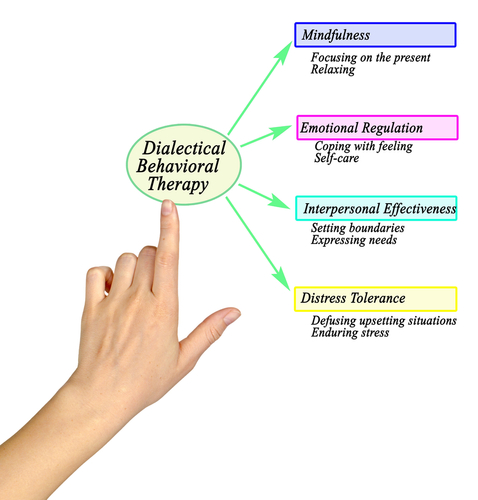Psychologist Marsha M. Linehan developed dialectical behavior therapy (DBT) in the late 1980s as a means to help better treat chronically suicidal individuals diagnosed with borderline personality disorder (BPD). It is a form of evidence-based psychotherapy that is founded on the principals of cognitive behavioral therapy (CBT), but places greater emphasis on the psychosocial aspects of treatment. DBT combines standard CBT techniques for emotional regulation and reality testing with concepts derived from Buddhist meditative practice such as awareness, mindfulness, and attentiveness to current situations and emotional experiences to encourage acceptance. The philosophical perspective of dialectics, balancing opposites, influences the DBT process. As explained by Behavioral Tech, DBT focuses on teaching four sets or modules of behavioral skills, which include:
- Core mindfulness: the practice of being completely present and aware in any given moment
- Distress tolerance: increasing an individual’s tolerance of negative emotion as opposed to attempting to avoid or escape them
- Emotion regulation: decreasing emotional impulsivity, learning to manage and shift intense, problematic emotions
- Interpersonal effectiveness: authentically advocating for one’s own wants and needs in a relationship in a way that is both self-respecting and non-damaging
A mental health clinician offering DBT services works with an individual to identify ways to hold two seemingly opposite perspectives simultaneously. This, in turn, promotes balance and minimizes the tendencies to think in absolutes (e.g., viewing all in black and white, all-or-nothing style of thinking, etc.). DBT encourages an inclusive worldview and perspective instead of an exclusive outlook on life.
Distress Tolerance Skills
Distress tolerance is one of the four modules in DBT. The skills in this module are often referred to as “crisis survival skills,” because they are meant to help individuals learn various techniques for surviving an immediate emotional crisis without making it worse and managing actual or perceived emotional distress. DBT Made Simple provides examples of the most frequently taught distress tolerance skills which include, but are not limited to the following:
- Self-soothing techniques: there are a variety of self-soothing techniques that can be used to ground oneself mentally and emotionally.
- TIPP skills: TIPP is an acronym for Temperature, Intense exercise, Paced breathing, and Paired muscle relaxation. TIPP skills quickly calm the limbic system and lower the state of emotional arousal.
- STOP skill: STOP is an acronym for Stop, Take a step back, Observe, and Proceed mindfully, which can help an individual avoid engaging in impulsive behavior.
- Weigh the pros and cons: noting the pros and cons can help an individual pause and take a moment to think logically about a situation and the subsequent steps.
- Radical acceptance: is simply accepting the state of things as they are, without working to change them.
- Distraction: in moments of intense overwhelm, temporary distractions (e.g., calling a friend, reading a book, watching TV, etc.) can provide brief relief from the distressing situation.
- IMPROVE skills: the acronym IMPROVE stands for: Imagery, Meaning, Prayer, Relaxation, One thing in the moment, Vacation, and Encouragement, all of which can help with improving the moment.
Distress tolerance skills help individuals cope with feelings that do not have an immediately known resolution. Crisis survival skills are short-term coping strategies intended to help manage emotional pain to avoid destructive behavior. Employing distress tolerance skills can help a person effectively minimize the intensity of emotional pain.
Disclaimer:
The information above is provided for the use of informational purposes only. The above content is not to be substituted for professional advice, diagnosis, or treatment, as in no way is it intended as an attempt to practice medicine, give specific medical advice, including, without limitation, advice concerning the topic of mental health. As such, please do not use any material provided above to disregard professional advice or delay seeking treatment.


